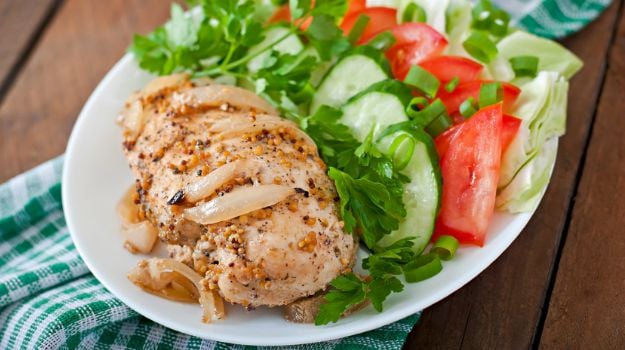Are you one of those who signed up for an annual gym membership on January 1 and lost your way to the same gym before February arrived? Or a calorie counter who constantly watches what your friends are ordering at a restaurant, constantly reminding them about the calories in each of their indulgences. With information abundantly available, often unverified wellness and fitness tips border on impracticality and many times they are just not sustainable, sending you back to square one. I’ve believed that wellness begins with awareness – knowing your body and what makes it tick and then devising a fitness and diet routine that is impactful, practical and above all sustainable:1. Define what wellness means to you: And let that be your compass as you make a choice every single time – whether it’s a dietary choice or a fitness routine. For me, it's about having the energy and fitness to keep pace with an action-packed day, the frequent travel and not letting my fitness level stand in the way of all the things on my bucket list. So whether it’s a tough (within a reasonable definition) trek with a magnificent view at the end of it or a high adrenaline activity like diving or zip-lining, I don’t want to be the one to say – ‘I can't do it’.

2. Re-look at your everyday diet: You will find that convenience and not nutrition is the overriding factor. I’m not asking you to completely alter your monthly grocery list but do look at those daily ingredients in your diet – rice, atta, sugar, milk, fruits, cooking oil, even breakfast cereal and ask yourself if you can find healthier options on a sustainable basis. You’ll be surprised! 3. A good night’s sleep is half the battle won: If you need your Fitness Band to tell you about the quality of your sleep, you’re not in the best situation. Instead, focus on the smaller details and begin by keeping your bed gadget free. I am occasionally guilty of dropping off with my iPad and I can vouch for the piercing light of vibrant displays that can affect your sleep.
Aromatherapy helps too – fragrant candles or a mild scent; lavender oil is a proven winner. Night caps work well too, especially when you are in a new environment. Chamomile tea with its calming properties or your grandmother’s age-old recipe of warm milk with a few strands of saffron and powdered almonds are both great options. Don’t skimp on your pillows; invest in a good set - firm pillows if you need neck support, medium pillows for back sleepers and soft pillows for front sleepers (to ease the strain on your neck).

4. Don’t get swayed by fitness fads: Take your own time and zero in on one that works for you. I love the outdoors and have usually failed every time I opt for a ‘gym only’ type fitness routine. Build the routine around your work schedule rather than disrupt it. Yes, cut any likely excuses out of that fitness routine – a gym that involves negotiating traffic or an ‘outdoors only’ fitness routine without a Plan B during the monsoon are both doomed to fail. Sport works best for me – there’s the fun element, a cool peer group and the occasional competitive streak that keeps you engaged. And before you quiz the ‘calorie burn’ potential of your next fitness routine, do a reality check on the sustainability.5. Don’t blindly follow your dietician’s micro-plan: If your dietician is one of those who devises an hour by hour chart that’s just too much work for you or worse still, people around you. Of course, nobody understands diets better than your dietician but make sure those charts balance wellness with practicality.6. The magic of substitution and eating smart: Does replacing a naan with a wheat-only tandoori roti make a big difference to your meal experience. It didn’t in my case and it’s something I’ve stuck to. Can your favorite restaurant make grilled chicken taste as delicious as fried chicken? Small tweaks that don’t impact taste make a big difference without you having to make major compromises. So whether it’s at home or at a restaurant, eat smart without swinging to extremes. Don’t let the portion size dictate how much you eat at a restaurant; listen to your gut instead. There’s a famous saying in Okinawa, Japan (one of the world’s ‘Blue zones’ where people lead active lifestyles well beyond 80) – ‘Hara Hachi Bu’ (Eat until you are 80% full).

7. Be aware of what you eat but don’t obsess: You don't need to be a genius to figure out that a greasy bowl of fries is not health food and yet you will be amazed at the number of health food options that also taste delicious. Don't obsess with calorie counts of food and yes it's okay to occasionally binge. Just find the balance. I almost gave up eating high-calorie desserts (one of my big food vices) during the weekdays but it was sustainable because I would reward myself every weekend with my favourite desserts. There's the 'happiness quotient' (I'm not sure it's a recognized phrase yet!) that a good dish or a great meal can bring that is immeasurable unlike calories.8. Shop like a pro: No, it doesn't always involve going to a fancy gourmet store. From millets to unpolished rice, there is so much available in the market today, retail or online. Michael Pollen's 'In Defense of Food' changed the way I look at food. He suggests you take your grandmother (or your mother) to a supermarket and anything she doesn't recognise as food isn't worth consuming! It might be a strong view but it highlights a valid point - the more processed your food is, the unhealthier it is, with a potential to cause long term health damage. No, I'm not suggesting you discard your refrigerator but just be conscious about what you stock in it.

9. Travel smart: I’ve hardly ever experienced jet lag despite frequent travel. One of the things that has worked for me is switching my sleep cycle to the time zone I’m traveling to (I start a few hours before I board the flight). Staying hydrated is critical on those never-ending flights. I usually carry an empty bottle and refuel (most International flights feature a water dispenser). Foods with magnesium work remarkably well to help you grab a good night’s sleep when you switch time zones. The good news – Dark chocolate is on that list too. And so are dark leafy greens and fish. Melatonin is a key ingredient as well – bananas, oranges, oats and sweet corn have generous amounts.

10. It’s not what you eat but how you eat it: It’s no surprise, societies where communal meals are big (like Sardinia in Italy) boast of a longer life expectancy. While it’s next to impossible in big cities, at least make sure you eat at a dining table (your work desk does not qualify as a table). Pizza with your mates during a big India game is one thing but polishing off a painstakingly cooked dinner in front of your large screen TV doesn’t cut it. Food – even if it’s yesterday’s leftovers, is a deep, multi-sensory experience and how you eat your food can actually have an impact on your wellness. No kidding.

2. Re-look at your everyday diet: You will find that convenience and not nutrition is the overriding factor. I’m not asking you to completely alter your monthly grocery list but do look at those daily ingredients in your diet – rice, atta, sugar, milk, fruits, cooking oil, even breakfast cereal and ask yourself if you can find healthier options on a sustainable basis. You’ll be surprised! 3. A good night’s sleep is half the battle won: If you need your Fitness Band to tell you about the quality of your sleep, you’re not in the best situation. Instead, focus on the smaller details and begin by keeping your bed gadget free. I am occasionally guilty of dropping off with my iPad and I can vouch for the piercing light of vibrant displays that can affect your sleep.
Aromatherapy helps too – fragrant candles or a mild scent; lavender oil is a proven winner. Night caps work well too, especially when you are in a new environment. Chamomile tea with its calming properties or your grandmother’s age-old recipe of warm milk with a few strands of saffron and powdered almonds are both great options. Don’t skimp on your pillows; invest in a good set - firm pillows if you need neck support, medium pillows for back sleepers and soft pillows for front sleepers (to ease the strain on your neck).

4. Don’t get swayed by fitness fads: Take your own time and zero in on one that works for you. I love the outdoors and have usually failed every time I opt for a ‘gym only’ type fitness routine. Build the routine around your work schedule rather than disrupt it. Yes, cut any likely excuses out of that fitness routine – a gym that involves negotiating traffic or an ‘outdoors only’ fitness routine without a Plan B during the monsoon are both doomed to fail. Sport works best for me – there’s the fun element, a cool peer group and the occasional competitive streak that keeps you engaged. And before you quiz the ‘calorie burn’ potential of your next fitness routine, do a reality check on the sustainability.5. Don’t blindly follow your dietician’s micro-plan: If your dietician is one of those who devises an hour by hour chart that’s just too much work for you or worse still, people around you. Of course, nobody understands diets better than your dietician but make sure those charts balance wellness with practicality.6. The magic of substitution and eating smart: Does replacing a naan with a wheat-only tandoori roti make a big difference to your meal experience. It didn’t in my case and it’s something I’ve stuck to. Can your favorite restaurant make grilled chicken taste as delicious as fried chicken? Small tweaks that don’t impact taste make a big difference without you having to make major compromises. So whether it’s at home or at a restaurant, eat smart without swinging to extremes. Don’t let the portion size dictate how much you eat at a restaurant; listen to your gut instead. There’s a famous saying in Okinawa, Japan (one of the world’s ‘Blue zones’ where people lead active lifestyles well beyond 80) – ‘Hara Hachi Bu’ (Eat until you are 80% full).

7. Be aware of what you eat but don’t obsess: You don't need to be a genius to figure out that a greasy bowl of fries is not health food and yet you will be amazed at the number of health food options that also taste delicious. Don't obsess with calorie counts of food and yes it's okay to occasionally binge. Just find the balance. I almost gave up eating high-calorie desserts (one of my big food vices) during the weekdays but it was sustainable because I would reward myself every weekend with my favourite desserts. There's the 'happiness quotient' (I'm not sure it's a recognized phrase yet!) that a good dish or a great meal can bring that is immeasurable unlike calories.8. Shop like a pro: No, it doesn't always involve going to a fancy gourmet store. From millets to unpolished rice, there is so much available in the market today, retail or online. Michael Pollen's 'In Defense of Food' changed the way I look at food. He suggests you take your grandmother (or your mother) to a supermarket and anything she doesn't recognise as food isn't worth consuming! It might be a strong view but it highlights a valid point - the more processed your food is, the unhealthier it is, with a potential to cause long term health damage. No, I'm not suggesting you discard your refrigerator but just be conscious about what you stock in it.

9. Travel smart: I’ve hardly ever experienced jet lag despite frequent travel. One of the things that has worked for me is switching my sleep cycle to the time zone I’m traveling to (I start a few hours before I board the flight). Staying hydrated is critical on those never-ending flights. I usually carry an empty bottle and refuel (most International flights feature a water dispenser). Foods with magnesium work remarkably well to help you grab a good night’s sleep when you switch time zones. The good news – Dark chocolate is on that list too. And so are dark leafy greens and fish. Melatonin is a key ingredient as well – bananas, oranges, oats and sweet corn have generous amounts.

10. It’s not what you eat but how you eat it: It’s no surprise, societies where communal meals are big (like Sardinia in Italy) boast of a longer life expectancy. While it’s next to impossible in big cities, at least make sure you eat at a dining table (your work desk does not qualify as a table). Pizza with your mates during a big India game is one thing but polishing off a painstakingly cooked dinner in front of your large screen TV doesn’t cut it. Food – even if it’s yesterday’s leftovers, is a deep, multi-sensory experience and how you eat your food can actually have an impact on your wellness. No kidding.
Advertisement
About Ashwin RajagopalanI am the proverbial slashie - a content architect, writer, speaker and cultural intelligence coach. School lunch boxes are usually the beginning of our culinary discoveries.That curiosity hasn’t waned. It’s only got stronger as I’ve explored culinary cultures, street food and fine dining restaurants across the world. I’ve discovered cultures and destinations through culinary motifs. I am equally passionate about writing on consumer tech and travel.






